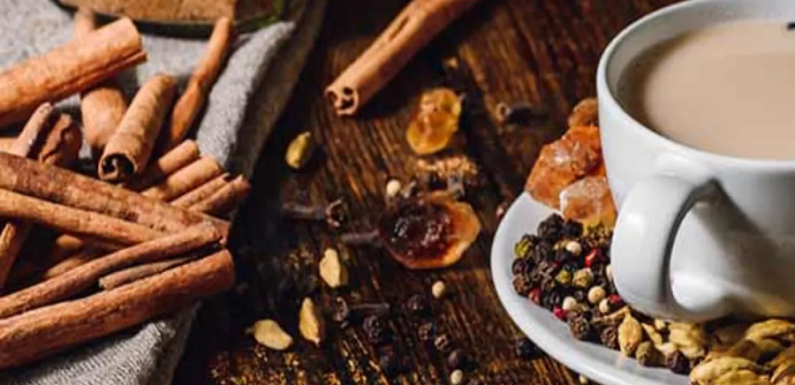
Indian masala tea is a timeless beverage that has delighted palates for centuries. As with many teas, it is believed to have originated from China and then was imported to India by the British during colonial times. It thus became a staple in Indian culture, where it took on the name “Masala Tea” and experienced a few fixings of its own: milk and sugar. Some of the more common spices include Cardamom, Cloves, Ginger, Cinnamon, Star anise, fennel seeds, and Peppercorn. The often-used herbs include basil, peppermint, sage, and lavender. The amount of each ingredient depends on the personal preference of the person brewing it.
Masala chai is traditionally brewed in a saucepan on the stovetop to get the most flavor from the spices and ensure the milk doesn’t burn. Once it’s brewed and the herbs have infused flavor into the tea and milk, the mixture is strained, leaving you with just a delicious, richly-flavored cup of masala chai.
Ingredients and their benefits
Masala Tea is not just a beverage; it is an experience. For those who enjoy a steaming cup of tea or coffee to start their day, introducing Masala Tea into your morning routine can transform your life.
Aromatherapy has been used for thousands of years to bring peace, calm, and clarity to the mind, and Masala Tea’s unique blend of spices and herbs brings this ancient art into modern times. The smell alone can put you at ease and prepare you for the day ahead.
But there are so many more benefits to Masala Tea!
Ginger

When we add ginger to our masala tea, we’re not just adding a tangy taste that’s sweet and spicy. We’re also adding a host of health benefits, precious during this cold season.
Ginger, one of the most popular spices globally, is an excellent source of nutrients and has been used for thousands of years to treat various ailments—from indigestion and nausea to arthritis and heart disease.
Its anti-inflammatory properties make it an excellent natural remedy for colds, sore throats, and coughs. It’s even been shown to be more effective than over-the-counter decongestants at relieving nasal congestion!
Ginger can even reduce irritation in the airways caused by asthma, so you can breathe easily while drinking your tea.
Finally, ginger can help with muscle soreness—so if you’ve got a case of the wintertime blues, ginger is here for you.
Cardamom

While we know cardamom as the ingredient that gives chai its signature spicy flavour, cardamom is also an essential part of a traditional Indian masala tea known for its therapeutic properties.
Cardamom has been shown to help with everything from menstrual pains and indigestion to blood pressure issues, kidney stones, and toothaches. It’s also been shown to improve skin health and freshen breath.
And that’s not all! Cardamom can also help fight ageing and wrinkles and protect against cancer. It helps with depression, too—not just because depression can be satisfied with the presence of other people (as is often true when we sit down for a cup of tea), but because the scent of cardamom releases serotonin in our brains promotes feelings of happiness.
Cinnamon

Cinnamon is a spice that has been used in masala tea to treat a variety of ailments for millennia. This is because it contains several chemicals known to have health benefits. Among these are cinnamaldehyde, cinnamic acid, and cinnamate.
Cinnamon is known to possess antimicrobial properties, which can help treat infections. It can also act as an expectorant, helping to clear the lungs of mucus. In addition to its antimicrobial properties, cinnamon has antioxidant compounds that can protect cells from free radical damage, which can cause cancer or other diseases.
It has been shown to lower cholesterol and triglyceride levels in people with diabetes. This can be especially beneficial for those with elevated levels of LDL cholesterol and triglycerides.
It is thought to help your body process insulin more effectively—which could mean that drinking cinnamon tea could help you manage diabetes. Cinnamon can also help fight inflammation and bacterial infections, making it useful as a cold remedy during the winter months.
Cloves

Cloves are an excellent addition to masala tea. They can aid in digestion and help you get the most out of your tea. This is because cloves contain the chemical eugenol, which helps to reduce the amount of pain your body feels during digestion.
The bioactive compounds eugenol and caryophyllene in cloves reduce histamines production in the body. Histamines are released when you’re sick, and they cause a variety of symptoms, including a stuffy nose, runny nose, sneezing, coughing, and itchy, watery eyes. By consuming more cloves (in tea or other forms), you can reduce the production of these histamines.
Cloves contain essential oils that kill harmful bacteria that cause cavities and gum disease. These oils also have anti-inflammatory properties that can help soothe pain caused by oral issues. Cloves also contain antiseptic and antifungal properties, so they can keep your teeth healthy, clean, and strong.
Peppercorn

A pinch of peppercorn in your masala tea might be what you need to take your tea game to the next level. For centuries, people have added peppercorns to their teas for an extra kick and many benefits.
Peppercorns are a great source of antioxidants that can help to keep your immune system in top shape, reduce the risk of chronic diseases, and even combat free radicals. They contain the same type of antioxidants found in green tea and chocolate, which can help protect against cancer, heart disease, and aging.
Peppercorns also help to increase circulation throughout the body. This means they will give you a boost of energy and improve your mood. They do this by increasing blood flow to all parts of your body, making you feel more alert and less tired.
They can help with weight loss as well—the capsaicin found in these berries helps curb hunger pangs by regulating hormones that signal when you’re hungry or full. It also helps reduce inflammation throughout the digestive tract, so it’s easier for food to move through it without getting stuck on its way out!
It may act as a stimulant to help combat bloating, nausea, and indigestion. Pepper may also help eliminate muscle pain and improve feelings of drowsiness and fatigue.
Fennel Seeds

The benefits of drinking fennel in masala tea are wide-ranging.
First and foremost, fennel is an excellent source of fibre. The seeds are also high in antioxidants such as flavonoids and phenolic acids, which help to protect the body from free radicals. Fennel seeds have also been shown to protect against oxidative stress and have anti-inflammatory properties.
Fennel seeds are also a natural laxative, which may help relieve abdominal pain and constipation. They may also help prevent bloating, so many drink fennel tea before a meal.
The seeds are rich in essential oils, including anethole and estragole. These chemicals are believed to have antibacterial properties, which can help aid the digestive process.
Fennel seeds are known as a natural remedy for upset stomachs and colic. It can also stimulate the production of bile, a substance that helps break down fat and have antioxidant effects, reducing inflammation.
What’s more, fennel is a natural diuretic, so it can help you to lose water weight! And the anti-inflammatory benefits of fennel make it a popular ingredient in herbal remedies for acne. It can also help with arthritis and throat swelling.
In a gist, Indian Masala tea is a very refreshing and soothing tea with lots of benefits. You unquestionably shouldn’t miss out on this heavenly tonic!

